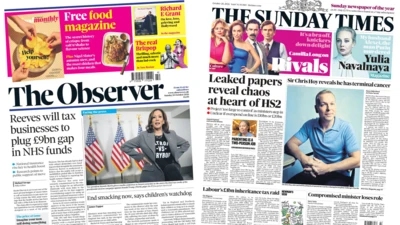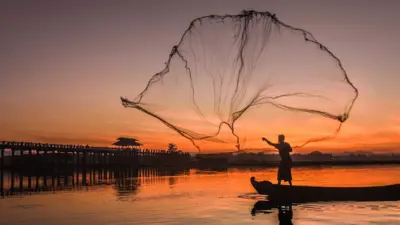We've updated our Privacy and Cookies Policy
We've made some important changes to our Privacy and Cookies Policy and we want you to know what this means for you and your data.
Ukrainian edible carrier bag wins award
Image source, 1+1 TV
- Author, News from Elsewhere...
- Role, ...as found by ΒιΆΉΤΌΕΔ Monitoring
Ukrainian scientists have invented an eco-friendly plastic bag that decomposes quickly, does not pollute the environment, and what's more you can eat it once it's worn out.
Dr Dmytro Bidyuk and his colleagues discovered the material as a by-product of combining natural proteins and starches in their laboratory at the National Agrarian University in Sumy in north-eastern Ukraine, the local news site reports.
They have moulded cups, drinking straws and bags from seaweed and a starch derived from red algae. These would otherwise be made from disposable plastic, which can take hundreds of years to decompose.
"The main advantage of this cup is that it completely decomposes in 21 days," Dr Bidyuk told . The bag, he added, disintegrates in the earth in just over a week.
Image source, 1+1 TV
The cups can be frozen or used to bake cupcakes, but their unique quality is that they are all fit for human consumption.
You may also be interested in:
There have been examples of bags made in and that can be turned into animal fodder, and a British company is developing edible , but the Ukrainian innovation is, according to Dr Bidyuk, "al dente, rather like noodles".
The logos and colouring are derived from natural food dyes, and straws can be flavoured so "you can enjoy a drink of fruit juice then take a bite out of the straw," he added.
Ukrainian environmental campaigners are excited by the prospect of disposable plastic being replaced by variants of this material, the TV correspondent said, especially as its fertiliser properties could see landfill sites planted with conifers. They are urging the government to invest.
In the meantime, the Sumy team won the Sustainability Award at the University Startup World Cup in Copenhagen this month, and are talking to foreign partners funding further research.
Image source, 1+1 TV
Reporting by Vitaly Shevchenko and Martin Morgan
Use #NewsfromElsewhere to stay up-to-date with our reports via .
Top Stories
More to explore
Most read
Content is not available








